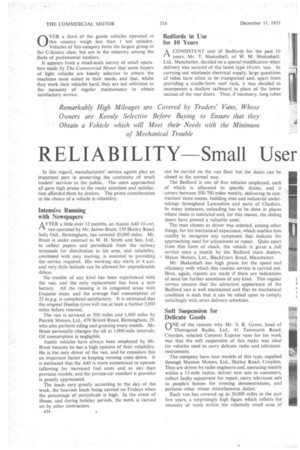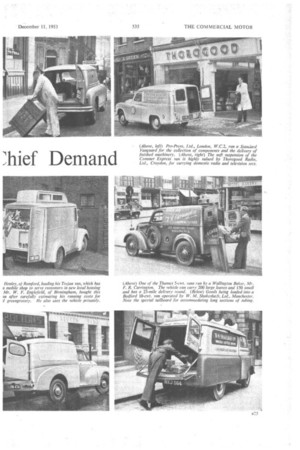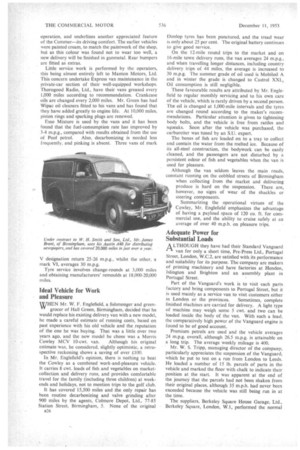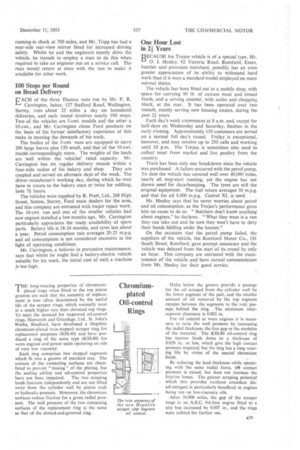RELIABILITY Small User
Page 58

Page 59

Page 60

Page 63

If you've noticed an error in this article please click here to report it so we can fix it.
:hief Demand
Remarkably High Mileages are Covered by Traders' Vans, Whose Owners are Keenly Selective Before Buying to Ensure that they Obtain a Vehicle which will Meet their Needs with the Minimum of Mechanical Trouble
OVER a third of the goods vehicles operated in this country weigh less than 1 ton unladen. Vehicles Of this,category form the largest group in the C-licence class, but are in the minority among the fleets of professional hauliers.
It appears from a small-scale survey of small operators made by The Commercial Motor that some buyers of light vehicles are keenly selective to obtain the machines most suited to their needs, and that, whilst they work their vehicles hard, they are not oblivious to the, necessity of regular maintenance •to obtain satisfactory service.
In this regard, manufacturers' service agents play an important part in preserving the continuity of small traders' services to the public. The users approached all gave high praise to the ready attention and satisfaction afforded them by dealers. The prime consideration in the choice of a vehicle is reliability.
Intensive Running with Newspapers
A FL ER a little over 12 months, an Austin A40 10-cwt.
i—k van operated by Mr. James Brant, 159 Heeley Road, Selly Oak, Birmingham, has covered 20,000 miles. Mr. Brant is under contract to W. H. Smith and Son, Ltd., to collect papers and periodicals from the railway terminals for distribution in his area, and reliability, combined with easy starting, is essential to providing the service required. His working day starts at 4 a.m. and very little latitude can be allowed for unpredictable delays.
No trouble of any kind has been experienced with the van, and the only replacement has been a new battery. All the running is in congested areas with frequent stops, and the average fuel consumption of 25 m.p.g. is considered satisfactory. It is estimated that the original Dunlop tyres will run at least a further 5,000 miles before renewal.
The van is serviced at 500 miles and 1,000 miles by Patrick Motors, Ltd., 479 Bristol Road, Birmingham, 29, who also perform oiling and greasing every month. Mr. Brant personally changes the oil at 1,000-mile intervals. Oil consumption is negligible.
Austin vehicles have always been employed by Mr. Brant because he has a high opinion of their reliability. He is the only driver of the van, and he considers this an important factor in keeping running costs down. It is estimated that the A40 is more economical to operate (allowing for increased fuel costs and so on) than previous models, and the private-car comfort it provides is greatly appreciated.
The loads vary greatly according to the day of the week, the heaviest loads being carried on Fridays when the percentage of periodicals is high. In the event of illness, and during holiday periods, the work is carried on by other contractors.
e24 can be carried on the van floor but the doors can be closed in the normal way.
The Bedford is one of five vehicles employed, each of which is allocated to specific duties, and it covers between 500-700 miles weekly, delivering to contractors' store rooms, building sites and industrial undertakings throughout Lancashire and parts of Cheshire. In many instances, unloading has to be done in places where room is restricted and, for this reason, the sliding doors have proved a valuable asset.
The man chosen as driver was selected, among other things, for his mechanical experience, which enables him readily to recognize any symptoms that indicate the approaching need for adjustment or repair. Quite apart from this form of check, the vehicle is given a. full service once a month by the Bedford main dealers, Blakes Motors, Ltd., Blackfriars Road, Manchester.
Mr. Shakeshaft has high praise for the speed and efficiency with which this routine service is carried out. Here, again, reports are made if there are indications of need for further attentions of any kind. This regular service ensures that the attractive appearance of the Bedford van is well maintained and that its mechanical condition is such that it can be relied upon to comply unfailingly with strict delivery schedules.
Soft Suspension for Delicate Goods
(NE of the reasons why Mr. S. R. Green, head of
Thorogood Radio, Ltd., 45 Tamworth Road, Croydon, selected Commer Express vans for his work was that the soft suspension of this make was ideal for vehicles used to carry delicate radio and television instruments.
The company have four models of this type, supplied through Manton Motors, Ltd., Shirley Road, Croydon. They are driven by radio engineers and, operating mainly within a 15-mile radius, deliver new sets to customers, collect faulty equipment for repair, carry television sets to people's homes fOr evening demonstrations, and perform other minor miscellaneous .duties:
Each van has covered ,up to 30,000 miles in the past few. years, a surprisingly high figure which reflects the intensity of work within the relatively small area of operation, and underlines another appreciated feature of the Commer—its driving comfort. The earlier vehicles were painted cream, to match the paintwork of the shop, but as this colour was found not to wear too well, a new delivery will be finished in gunmetal. Rear bumpers are fitted as extras.
Little service work is performed by the operators, this being almost entirely left to Manton Motors, Ltd. This concern undertake Express van maintenance in the private-car section of their well-equipped workshops. Thorogood Radio, Ltd., have their vans greased every 1,000 miles according to recommendation. Crankcase oils are changed every 2,000 miles. Mr. Green has had Wipac oil cleaners fitted to his vans and has found that they have added greatly to engine life. At 10,000 miles, piston rings and sparking plugs are renewed.
Esso Mixture is used by the vans and it has been found that the fuel-consumption rate has improved by 3-4 m.p.g., compared with results obtained from the use of Pool petrol. Also, decarbonizing is needed less frequently, and pinking is absent. Three vans of mark V designation return 25-26 m.p.g., whilst the other, a mark VI, averages 30 m.p.g.
Tyre service involves change-rounds at 3,000 miles
and obtaining manufacturers' remoulds at 18,000-20,000 miles.
Ideal Vehicle for Work and Pleasure
WHEN Mr. W. F. Englefield, a fishmonger and greengrocer of Hall Green, Birmingham, decided that he would replace his existing delivery van with a new model, he made a careful estimate of running costs, based on past experience with his old vehicle and the reputation of the one he was buying. That was a little over two years ago, and the new model he chose was a Morris
Cowley MCV JO-cwt. van. Although his original estimate was, he considered, slightly optimistic, a retrospective reckoning shows a saving of over £100.
In Mr. Englefield's opinion, there is nothing to beat the Cowley as a combined work-and-pleasure vehicle. It carries 8 cwt. loads of fish and vegetables on marketcollection and delivery runs, and provides comfortable travel for the family (including three children) at weekends and holidays, not to mention trips to the golf club.
It has covered 15,500 miles and the only repair has been routine decarbonizing and valve grinding after 900 miles by the agents, Colmore Depot, Ltd., 77-85 Station Street, Birmingham, 5. None of the original B26 Dunlop tyres has been punctured, and the tread wear is only about 25 per cent. The original battery continues to give good service.
On the 12-mile round trips to the market and on 16-mile town delivery runs, the van averages 24 m.p.g., and when travelling longer distances, including country delivery trips of 44 miles, the average is increased to 30 m.p.g. The summer grade of oil used is Mobiloil A and in winter the grade is changed to Castro' XXL,, Oil consumption is still negligible.
These favourable results are attributed by Mr. Englefield to regular monthly servicing and to his own care of the vehicle, which is rarely driven by a second person. The oil is changed at 1,000-mile intervals and the tyres are changed round according to the maker's recommendations. Particular attention is given to tightening body bolts, and the vehicle is free from rattles and squeaks. Soon after the vehicle was purchased, the carburetter was tuned by an S.U. expert.
The boxes of fish are loaded on to a tray to collect and contain the water from the melted ice. Because of its all-steel construction, the bodywork can be easily cleaned, and the passengers are not disturbed by a persistent odour of fish and vegetables when the van is used for pleasure.
Although the van seldom leaves the main roads, constant running on the cobbled streets of Birmingham when collecting from the market and delivering produce is hard on the suspension. There are, however, no signs of wear of the shackles or steering components.
Summarizing the operational virtues of the Cowley, Mr. Englefield emphasizes the advantage of having a payload space of 120 Cuft. for commercial use, and the ability to cruise safely at an average of over 40 m.p.h. on pleasure trips.
Adequate Power for Substantial Loads
ALTHOALTHOUGH they have had their Standard Vanguard UGH for only a short time, Pre-Press Ltd., Portugal Street, London, W.C.2, are satisfied with its performance and suitability for its purpose. The company are makers of printing machinery and have factories at Hendon, Islington and Brighton and an assembly plant in Portugal Street.
Part of the Vanguard's work is to visit each parts factory and bring components to Portugal Street, but it is used mainly as a service van to visit customers either in London or the provinces. Sometimes, complete finished Machines are carried for delivery. .A light type of machine may weigh some 5 cwt. and two can be loaded inside the body of the van. With such a load, the comparatively high power of the Vanguard engine is found to be of good account.
Premium petrols are used and the vehicle averages 24 m.p.g. overall, although 26.5 m.p.g. is attainable on a long trip. The average weekly mileage is 400.
Mr. W. S. Tripp, managing director of the cornpany, particularly appreciates the suspension of the Vanguard, which he put to test on a run from London to Leeds. He loaded a number of 15 lb. parcels of parts in the vehicle and marked the floor with chalk to indicate their position at the start. It was apparent at the end of the journey that the parcels had not been shaken from their original places, although 35 m.p.h. had never been exceeded because the vehicle was still being run in at the time.
The suppliers, Berkeley Square House Garage, Ltd., Berkeley Square, London, W.1, performed the normal running-in check at 700 miles, and Mr. Tripp has had a near-side rear-view mirror fitted for increased driving safety. Whilst he and the engineers mostly drive the vehicle, he intends to employ a man to do this when required to take an engineer out on a service call. The man would return at once with the van to make it available for other work.
100 Stops per Round on Bread Delivery
f.ACH of the three Thames vans run by Mr. F. R. Carrington, baker, 157 Stafford Road, Wallington, Surrey, runs about 25 miles a day on household
deliveries, and each round involves nearly 100 stops. Two of the vehicles are 5-ewt. models and the other a 10-cwt., and Mr. Carrington chose Ford products on the basis of his former satisfactory experience of this make in meeting the demands of his trade.
The bodies of the 5-cwt. vans are equipped to carry 200 large loaves plus 150 small, and that of the 10-cwt.
model correspondingly more. The weights of the loads are well within the vehicles' rated capacity. Mr. Carrington has six regular delivery rounds within a four-mile radius of his bakery and shop. They are coupled and served on alternate days of the week. The driver-roundsman's working day, during which he may have to return to the bakery once or twice for refilling, lasts 71 hours.
The vehicles were supplied by R. Pratt, Ltd., 268 High Street, Sutton, Surrey, Ford main dealers for the area, and this company are entrusted with major repair work.
The 10-cwt. van and one of the smaller vehicles had new engines installed a few months ago, Mr. Carrington
particularly, appreciates the ready availability 'of spare parts. Battery life is 18-24 months, and tyres last about a year. Petrol consumption rate averages 20-25 m.p.g. and oil consumption is not considered excessive in the light of operating conditions.
Mr. Carrington, a believer in preventive maintenance, says that whilst he might find a battery-electric vehicle suitable for his work, the initial cost of such a machine is too high.
One Hour Lost in 2 Years
BECAUSE his Trojan vehicle is of a special type, Mr. 0. J. Henley, 92 Victoria Road, Romford, Essex, butcher and provision merchant, possibly has an even greater appreciation of its ability to withstand hard work than if it were a standard model employed on more normal duties.
The vehicle has been fitted out as a mobile shop, with space for carrying 90 lb. of carcass meat and tinned foods, and a serving counter, with scales and chopping block, at the rear. It has been operated over two rounds, mainly serving new housing estates, during the past 21 years.
Each day's work commences at 8 a.m. and, except for half-days on Wednesday and Saturday, finishes in the early evening. Approximately 150 customers are served on a normal full day's round. Friday is exceptional, however, and may involve up to 250 calls and working until 10 p.m. The Trojan is sometimes also used to collect meat from market and live poultry from the Country.
There has been only one breakdown since the vehicle was purchased. A failure occurred with the petrol pump. To date the vehicle has covered well over 40,000 miles, nearly all stop-start running, yet the engine has not shown need for decarbonizing. The tyres are still the original equipment. The fuel return averages 30 m.p.g. and that for oil 4,000 m.p.g. Castro! XL is used..
Mr. Henley says that he never worries about petrol and oil consumption, as the Trojan's performance gives him no cause to do so. "Butchers don't know anything about engines," he declares. "What they want is a van they can take out and be sure they won't have to dirty their hands fiddling under the bonnet."
On the occasion that the petrol pump failed, the suppliers of the vehicle, the Romford Motor Co., 181 South Street, Romford, gave prompt assistance and the vehicle was delayed from the start of its round by only an hour. This company are entrusted with the maintenance of the vehicle and have earned commendation from Mr. Henley for their good service.
Bedfords in Use for 10 Years
A CONSISTENT user of Bedfords for the past 10 I-1 years, Mr. T. Shakeshaft, of W. M. Shakeshaft, Ltd., Manchester, decided on a special modification when delivery was secured of the latest type 10-cwt. van. In carrying out wholesale electrical supply, large quantities of tubes have often to be transported and, apart from providing a cradle-form roof rack, it was decided to incorporate a shallow tailboard in place of the lower section of the rear doors. Thus, if necessary, long tubes




















































































































